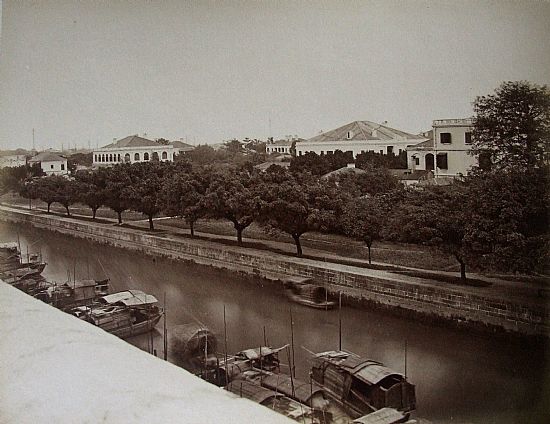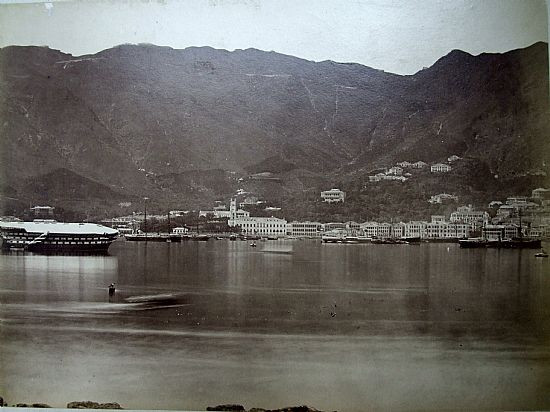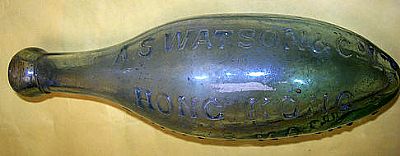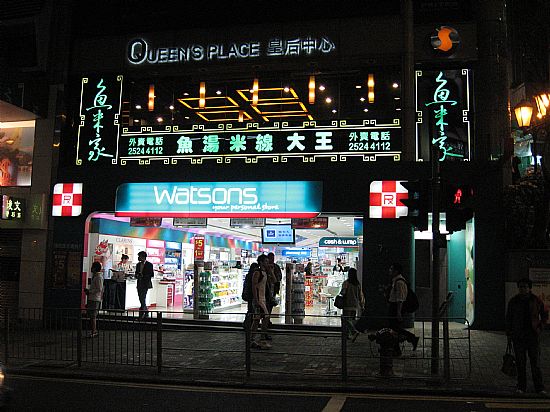ALEXANDER SKIRVING WATSON
Poland, Macau and Hong Kong
Under Watsons in Poland we find Alexander Skirving born 17th June 1837 at Dobrowa. He was baptised at Konigshutte (in ober Schlisien) Silesia by the Rev. Dr Henry Lippert on 23rd July 1837. He was one of several children born to Alexander Scott Watson and Agnes Watson (nee Kedslie). He died in London on 29th November 1865 and is buried in the Brompton Cemetery. I have a copy of a family tree written out as a list and presumably by the hand of one of the family and confirms the above. You can find more about his origins in that section.
My late father was very into family genealogy and the most comprehensive family tree diagramme is thanks to him (assisted by his surgeon cousin in England and others). His diagramme records Alexander Skirving Watson in Macau and his origins in Poland. But while I was reminded of the Polish connection, he never mentioned the Far East medical and pharmacy connection. He must have know about the details. Was this some kind of Christian Scientist bias? It was my relatives in Zimbabwe that got me following this trail properly. However I do find reference in his notes to the following. Perhaps he simply underestimated the significance.
It is of interest that Alexander Scott's brother, Thomas Boswell, born 30th August 1815, and who died in Edinburgh on 22nd May 1860, had nine children, six of whom were born in Macao between 1847 and 1855, where we understand he established a large warehouse business, Watson and Co.
See WATSON, THOMAS BOSWELL, his uncle for more detail index.asp?pageid=693964
First of all it is necessary to insert "Watson" behind each of these names. And then note from the description of the business that I give below that it was more than just a warehouse.
Before discussing Alexander Skirving Watson further, let's go way back to James and Janet Watson. Their children were Alexander Scott Watson, George Skirving Watson, Thomas Boswell Watson, Catherine Georgina Watson, James Lauder Watson and Frederick Lundy Watson. It was Thomas Boswell Watson (b Haddington 1815).
Alexander Scott Watson moved to Poland, married Agnes Kedslie and had 7 children there. At this point we single out Alexander Skirving Watson and his uncle Thomas Boswell Watson.
Watsons Chemists is ubiquitous with Hong Kong. Its tropical sea blue-green signage extremely familiar across the territory and also widespread across neighbouring countries. The company grew from a dispensary, but branched out into other fields. Today the A.S. Watson Group falls within Hutchison Whampoa Limited. That is world-wide. Even in Scotland we find them involved in such things as harbours. But on a more localised level they now own Savers and Superdrug in our high streets. (Watch out for products available there with “A. S. Watson” on them.
So if they are so prominent and have such a conspicuous Watson origin, why did I only here of him and them via Zimbabwe?
Let's first find out more about A. S. Watson.
My records show him as being born in Poland on the 17th June 1837. He died on the 29th November 1865. [ We immediately note a discrepancy with records of at least one online source company source - TBC].
The family tree compiled by my late father notes these dates and also of his uncle Thomas Boswell Watson. It was the latter who persuaded him to go to Macau and Canton.
The following is an abbreviated family tree based on my late father's diagram:
Skirvings
A Skirving died at Culloden in 1746. From that family we find George a feuer or proprietor of Melrose (d 1813) m Catherine Vogan
- Children : Janet b 1780 m & George un m
Janet marries James Watson, but this leeds to another branch.
Watsons
(I have included right down to recent times to show how we link to him).
Robert Watson m ?
Children : Alexander
Alexander m Jean Lauder
- 5 children of whom:
James b Kelso m Janet Skirving ob 1845
- 6 children of whom:
Thomas Boswell Watson b Haddington 30 August 1815 ob Edinburgh 22 May 1860 m Elizabeth Stedman
- 8 children
Alexander Scott Watson m Agnes Kedslie
- 6 children all in Poland
Thomas Boswell and Elizabeth Watson:
- 9 children who we see in Leith, Scotland and Macau
Alexander Scott Watson m Agnes Kedslie
- 7 children all of which we see born in Poland of whom Alexander Skirving Watson is the one who we discuss in this section. Note that Alexander Skirving Watson is the nephew of Thomas Boswell Watson.
We do not see Alexander Skirving Watson marrying or having children. He died in London in 1865.
But from James Watson, son of Alexander Scott Watson and Agnes Watson
- we see 5 children all born in Plymouth. Of these Alexander Richards Watson b 30 January 1873 who marries Ella Maud Newman in East London, South Africa.
Alexander and Maud (Ella) Watson
- have 5 children
- Jack Montague m Hilldegarde Walls
- Reginald Scott m Olive Forbes
- George Dennison m Edna Macfarlane
- Brian Watson m Pamela Wells
- Edward Graham m Elise Crockett
Of these I am the son of Brian. So while I and my cousins cannot trace a blood line through to Alexander Skirving Watson, we certainly share a great deal with him.
We are at last at the point at which we can discuss Alexander Skirving Watson's career.
A. S.WATSON & COMPANY
There are several sources online of which this is one of the more useful for the firm: https://www.encyclopedia.com/books/politics-and-business-magazines/watson-company-ltd
Another is this one which gives more information on A.S. Watson the man. https://industrialhistoryhk.org/alexander-skirving-watson-hk-pharmacist-and-merchant/
In order to understand the circumstances we need to turn back the clock on Hong Kong, but to understand how our Watsons fitted in we first have to look at Macau. Macau (or Macao), then in Portuguese administration, is a little incidental to our story even though it features within our family story. Thomas Boswell Watson had married Elizabeth Stedman and 6 of their 8 children had been born in Macao. One is also called Thomas Boswell Watson, but it is the father, Thomas Boswell Watson snr, Alexander Skirving Watson's uncle, that we need to first watch out for.
Wiki tells us : Macau is a Special Administrative Region (SAR) of the People's Republic of China. In 1557 it was leased to Portugal as a trading post. While it was to remain under Chinese sovereignty, the Portuguese came to consider and administer it as a de facto colony. Following the signing of the Treaty of Nanking between China and Britain in 1842, and the signing of treaties between China and foreign powers during the 1860s, establishing the benefit of "the most favoured nation" for them, the Portuguese attempted to conclude a similar treaty in 1862, but the Chinese refused, owing to a misunderstanding over the sovereignty of Macau. In 1887 the Portuguese finally managed to secure an agreement from China that Macao was Portuguese territory, ending 330 years of uncertainty. In 1999 it was handed over to China. Macau was the last extant European territory in continental Asia. This was where our Watsons lived. But why? Why not Hong Kong where they worked? As I understand it it was to control the expat population in Hosng Kong and the mainland.
The history of European imperialism in the region goes back a long time.
Key historical events were the The Opium Wars (or the Anglo-Chinese Wars). New World Encyclopedia gives a good account ( http://www.newworldencyclopedia.org/entry/Opium_Wars)These were two wars fought in the mid-1800s that were the climax of a long dispute between China and Britain. In the second, France fought alongside Britain. This dispute centered on the British India-grown opium import into China. The Qing emperor (Dao Guang) had banned opium in China, citing its harmful effects on health and deleterious impact on societal productivity. The British Empire, while also banning opium consumption within her border, saw no problem exporting the drug for profit. The Opium Wars and the unequal treaties signed afterwards led in part to the downfall of the Qing empire, as many countries followed Britain and forced unequal terms of trade with China.
We pick it up in the 19th century. A visit to the history museum in Kowloon gives us some perspective towards the latter aprt of the century: FOREIGN MERCHANTS IN HONG KONG – The free-port status of Hong Kong and its proximmity to Guangzhou attracted foreign merchants and a flow of capital to the territory. Within 20 years of becoming a port, as many as 73 foreign firms were established in Hong Kong. By 1893 business which had set up headquarters numbered 98 firms and 6 banks and trade volume for that year exceeded 20 pounds million sterling. The vast mahority of foreign merchants were British, the major firms being Butterfield and Swire, Dodwell and Company, A. S. Watson & Co, Jardine, Matheson & Co., and Land and Crawford.
We start to get a picture of dubious imperial practices and then opportunist commercial enterprise. How do our Watsons fit in?
Various medical missions were established. I have found reference to one in 1805 with the administration of vaccinations introduced at Canton by Dr. Alexander Pearson, Physician to the East India Company with many others from Macao to Hong Kong to Shanghai. It is into this tradition that we find the Canton Dispensary established.

This photo comes from an old album that I have. Although probably from the early 20th century, it gives an idea of Canton at the time. The photo is labelled Shameen Canton which signifies the divided nature of the town when both British and French administered it.
Wiki tells us :
A.S. Watson had its beginnings as the Canton Dispensary and Soda Water Establishment, founded in 1828,[5] as a small dispensary with the mission to provide free medical services to the poor people of the Southern Chinese province of Guangdong (also known as Canton). It moved to Hong Kong and re-emerged as the Hong Kong Dispensary from 1 January 1843 under proprietors Drs Alexander Anderson and Peter Young, trading at Capt Morgan's Bazaar.The company uses the date they moved to Hong Kong as its official date of establishment and does not describe their period in Guangzhou in their official account of their history; Richard Lord of the South China Morning Post stated that the company did this since one photograph is the only memorabilia and official document from their Guangzhou period.[5] Dr Alexander Skirving Watson joined the company in 1858. In 1869 the Hong Kong Dispensary was appointed to dispense to the Governor of Hong Kong and the Duke of Edinburgh. The company began trading under the name A.S. Watson & Company in 1871.
The A.S. Watson Group (or A.S. Watson or ASW) is the world's largest health and beauty retail group, with over 14,100 stores in 24 markets worldwide serving over 28 million customers per week, and over 3 billion customers and members throughout.
The Canton Dispensary had begun as a mission dispensing free medicine to the needy. It, as several others, was supplied via Macao. I have not worked out this dichotomy – rough shod Imperial political control that led to the Opium Wars and true altruistic efforts to care for the indigenous population. The locals were not just undeveloped and poor, but seem to have had their conditions worsened by the political situation and the too easy availability of opium. Were the two that linked?
Dispensaries such as this one became a meeting point and with that also a centre for commerce. From 1831 it began selling cures and medicines to the growing foreign community. The following year it commenced producing bottled aerated water ie soda water; a then new product, but which was to sweep the world. And other products were added.
Once the Opium Wars had ceased and Britain took over the Hong Kong islands, new opportunities arose. The dispensary was reestablished in Hong Kong in 1841 becming known as the Hong Kong Dispensary. The Watsons had not been involved untill this point.
The Watson's Calendar of 1897 notes : Experienced English Assistants only are employed in the preparation and dispensing of Medicines. And it advertises: 'Chairs (sedan chairs), Licensed Bearers Hill District, half hour, two bearers, at $0.15.'
Also available were : Prickly Heat Lotion, A Sovereigrn Remedy', and
Scotch Whisky at $10.80 per doz. case'.
Thomas Boswell Watson had been practicing as a physician in Macao, but moved it to Hong Kong in 1856 where it was very successful. He saw business potential and bought a stake in the Victoria Dispensary and also became a partner in the Hong Kong Dispensary. You will notice a trend away from purely altruistic distribution of free medicine to a business outlook.
There is a great deal of overlap between the stories of Thomas Boswell Watson and Alexander Skirving Watson. For more on Thomas refer to WATSON THOMAS BOSWELL.
He was beginning to think about retirement and rturning to Britain, but before he did so he enticed his nephew Alexander Skirving Watson to join him in the business.
Thomas Boswell Watson returned to Britain in 1859 and died there the following year aged just 44. [My records from my father show that he died in Edinburgh, but online company information shows “England”].
Alexander Skirving Watson was to be the Hong Kong Dispensary's first professional pharmacist. He and two physician partners took over the lease of the business. By 1862 the name of A. S. Watson was on both the premises and its products, becoming A. S. Watson & Co. In 1871.

This photo of Victoria, now engulfed by Central Hong Kong city, is from the same album that I have; probably from early 20th century. Although somewhat later, it still gives a good idea of the port city of the time.
With the exception of WWII, the company grew from strength to strength. More on that can be found here : https://www.encyclopedia.com/books/politics-and-business-magazines/watson-company-ltd
The museum in Kowloon brings home the positive aspects of British imperialism. But also the negative. The encouraged trade and then dependency on opium being perhaps the most distressing. As we have seen there were however various altruistic missions to help the population medically and the Canton Dispensary which became the Hong Kong Dispensary where Alexander Skirving Watson worked was one of them. It mayhave grown into the largest health care company, a sort of commercial empire, but I like to think that it was ethically motivated throughout.

The bottled soda water production was a separate division for a time, but today you can still buy it in Watsons Chemists in plastic bottles. Back at the time though bottles such as these were used. They were sealed with corks. The aeration put pressure on the corks and if they dried out they would shrink and would be more likely to pop. So the bottles were shaped so they simply could not be stored vertically. Laid horizontally meant continually damp corks and constant seal. Every thought about the term soda pop? [web picture]

I took this photo in Hong Kong in 2009 when we visited our younger daughter who was spending a year at Lingnan University, Tuen Mun.
Thomas Boswell Watson may have been out of the picture in one sense, but you can find more on him in his own section of this website. He became a notable artist.
This book was published in 2022. It gives a clear account of the growth of the company from Alexander onwards to the present day. Impressive.
WORLD SCIENTIFIC : Chapter One : 1841–1896: The Birth of A.S. Watson : Initial Public Offering and Opium Substitute https://worldscientific.com/doi/pdf/10.1142/9789811251535_0001
From King of Opium Substitutes to Global Health and Beauty Retailer: A S Watson by Patrick Chiu

